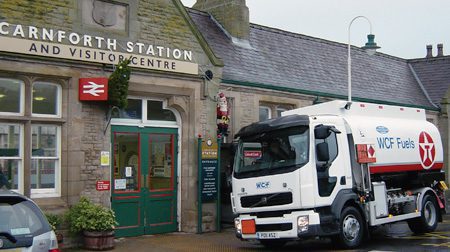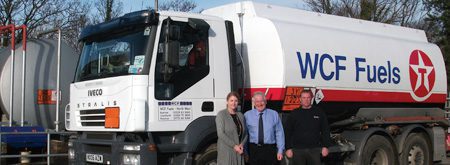
News
WCF Fuels – A brief encounter
Nestled in the heart of the Lancashire countryside, a mere stone’s throw from Carnforth station, which famously provided the setting for the 1945 film, Brief Encounter, lies WCF’s North West and Cumbria fuels division. Fuel Oil News recently met up with finance director, Jo Ritzema, North West general manager, Dave Spencer and commercial manager, Lynn Casson, at the company’s Carnforth depot
Employee matters
Founded as a farmers’ co-operative in 1911, the company was incorporated in 1988 and celebrated its centenary in style with a party last May. 100 years on WCF remains fiercely independent and proud of it.
The company is owned by 3800 private shareholders, including many employees, which as Jo pointed out, is unusual in the UK for a non public organisation. “All of our employees are shareholders and encouraged to have shares, under the various schemes that we offer. Last year every employee received a bonus of £1500 in shares. It’s important to us that there’s a very strong element of employee ownership. It gives employees a sense of belonging and demonstrates to them that their opinions are valued.”
Across the business, WCF employs approximately 250 people, around 50 of whom work in the company’s fuels businesses. “Staff retention is high,” says Jo. “This is partly down to our culture and partly down to location.” Proving the point, Jo has worked at WCF for 8 years, whilst Lynn has been there for 18 and Dave 23 years.
Experience counts
Following the removal of the default retirement age in October, the company is keen to retain drivers over 65. “It’s definitely an advantage to have older drivers in the business,” comments Jo. “Their local knowledge and existing customer relations are invaluable. It may be the case that an older driver is happy to work over the winter but would prefer the summer off to spend time with family, and we’re happy to accommodate that sort of request. The only downside, from a business point of view, is that the removal of the default retirement age, makes it very difficult to plan ahead.”
Geographical spread
The company consists of two main divisions; retail and specialised distribution, which includes fuels. WCF’s fuels sector operates from three main regions, all of which are run autonomously, each with its own general manager; North West (which covers South Lancashire to the Scottish Border, from the Irish Sea to the Pennines, as well as Wensleydale and Swaledale); North East (which encompasses Hexham and Northumberland, as well as the Tyne, Wear and Teesside areas) and Eastern (which primarily caters for the Yorkshire, Humberside and Lincolnshire areas, but also extends as far as Peterborough and into the Midlands).
With depots in Boston, Pocklington, Immingham, Carlisle, Carnforth, Hawkshead, Peterlee, Gosforth and Hexham, and more than 1.5 million litres of storage nationwide, the company is well placed to cater for its wide spectrum of customers. Across the three regions, the company operates in the domestic, retail, agricultural, commercial, industrial and marine sectors.
Currently, the company operates 32 tankers, which are normally leased on an 8 year basis, from a number of different companies. “We made an operational decision to lease, rather than buy tankers, as it gives us more flexibility,” explains Jo. “Often though, we’ll buy the tankers at the end of the lease period, if they have performed well.”
Whatever the weather
Like many other distributors, the severe weather last winter caused problems for WCF, but Dave said: “I can’t think of one person that we let down. The weather was terrible but we got through it because of our fantastic staff and drivers. Our drivers didn’t give up, even in the most badly affected areas, and on a couple of occasions, tankers got stuck and damaged.” Lynn echoed this: “Communication is extremely important to us. We never put the phones on voicemail during working hours and we always get back to people to keep them up to speed with their deliveries.”
Indeed, it is the customer contact that makes WCF and the fuel distribution sector as a whole, an attractive place to work: “We have a variety of different customers and a good level of contact with them in the office. It’s very much a localised industry and as a result, we get to know our customers well. We get lots of indirect, positive customer feedback from our drivers,” says Lynn.
When asked what is the biggest headache in the industry, Dave had to think hard: “Probably the uncertainty of supply from the refineries. We get more outages than we would like. Fuel is also way too expensive.” For Jo it is the sheer number of people competing in a small area. “Fuel distribution is a mature market and innovation is difficult. We need to make sure we are better than the competition.”
Moving with the times
In order to expand its customer base, compete with other firms and offer buying flexibility, the company has an online presence. In addition to individual websites for each separate region, which allow customers to order oil and manage their accounts online, WCF also operates www.fuelfighter.co.uk. “Fuelfighter is not a huge resource,” says Jo “but we wanted to have an additional internet presence for those customers who prefer to order their fuel online.”
Looking ahead: “We’re aiming for steady growth,” says Jo. We are focussed on increasing our customer base, in what is a huge geographical area. Although we’re always in the market for acquisitions that add value to the company, we do have to be realistic that there is normally excess competition for those businesses that do come onto the market.”



